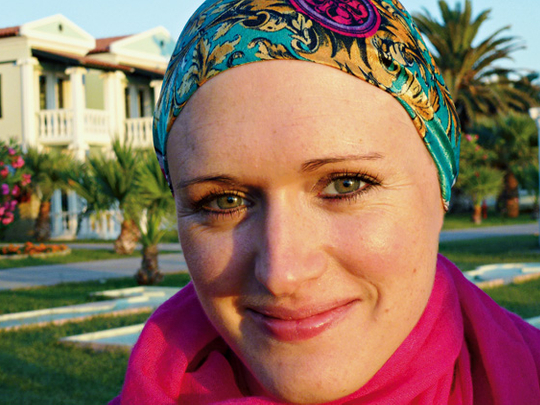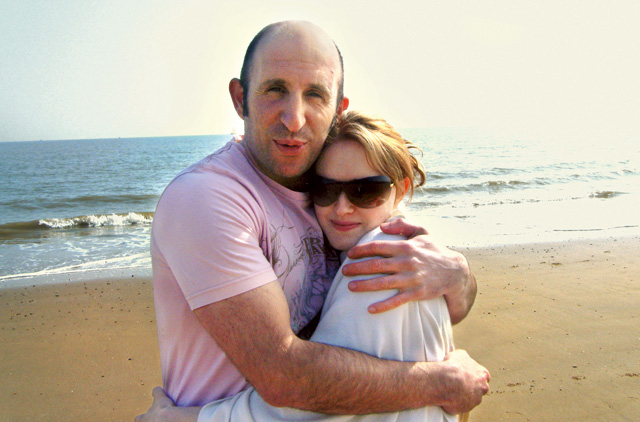
I didn’t know there was anything wrong with me before I had a massive seizure in my sleep. My boyfriend Pete Cohen thought I was having a nightmare at first, but when he couldn’t wake me, he realised I was unconscious and called an ambulance.
I came round in hospital a few days later and didn’t remember anything. I underwent countless tests, absolutely terrified as I realised something was seriously wrong.
A week after having CAT and MRI scans I was told I had a brain tumour the size of a golf ball. It was in the frontal lobe and had probably been growing there for years. The doctor gave me three options: leave it and see what happened, have a biopsy to discover what type of tumour it was and how aggressive, or go for surgery to try to remove as much of it as possible.
Everybody else went into panic, but the shock calmed me. I decided to have the operation, hopeful that it would get rid of it. Inside, of course, I was scared, and I could see just how frightened Pete was. It wasn’t an easy decision but there really wasn’t another choice.
I was in hospital for two weeks following the first seizure and put on strong medication to stop me having fits. Unfortunately, I still had about four more seizures – including one two nights before my surgery last April – after being discharged because the tumour was growing and putting so much pressure on my brain.
Fear pulsed through me as I was wheeled to theatre for my operation. I was kept awake for two and a-half hours of the six-hour surgery – the medical team wanted to make sure they weren’t damaging any of the part of my brain, where the tumour was, relating to speech and language. So I’d made a list of what to talk about with the speech therapist during the operation, such as meeting Pete at a conference in Croatia the year before; my favourite American TV series, Friends, and my niece who’d been staying with my family the week before my seizure.
I remember having to touch my fingers with my thumbs to check movement was still there, that my hand or my leg would involuntarily move when the surgeon touched a particular part of my brain and asking the anaesthetist to scratch an itch on my nose. “It’s going fine, we’re putting you back to sleep now,” a voice said to me and everything went black.
Dealing with the news
Pain throbbed through the inside of my skull as I peeled my eyes open. Groggy, I focused and saw Pete smiling down at me. “Hello,” I croaked. “Have I still got all my hair?” I beamed as Pete nodded. My long blonde locks were my pride and joy, and the surgeons had managed to operate without having to shave any of it.
I was in hospital for five days before going home to rest and getting the biopsy results.
I tried to keep busy so I didn’t dwell on what the doctors would say. But it was hard.
Two weeks later, we went back to see my consultant and specialist nurse. I sensed it before they even spoke. Their faces were so serious it had to be bad news. My tumour was cancerous and had a scary name – anaplastic astrocytoma. Obviously medical professionals have to be detached when they deliver the news, but we completely broke down. I tried to bite back sobs so I could hear what they were saying. There are four grades of brain tumours with the fourth being the worst. Mine was grade three. The statistics being quoted said that a person with a grade-three tumour lives for around five years. I blinked for a moment, realising they meant me.
I left the hospital, in a daze. We went to sit in a park for two or three hours, working out how we were going to tell everyone.
I rang my dad, feeling ashamed that he had to deal with this news. I didn’t want to upset him. Pete and I rang our close friends and family and it became easier each time. We got a chain going to spread the news so I didn’t have to ring everybody, which was a relief. That gave me the space to come to terms with the diagnosis. Once I was able to get my head around it, I felt detached from it: I needed to get through the next stage now.
I started radiotherapy eight weeks after the surgery. It was full on – six weeks of treatment, Monday to Friday. I coped well at first, until my hair came out in clumps. I was warned there could be a few patches of fall, but I lost it all. I wore headscarves but I mourned my hair.
I work in skincare sales and am used to having to look my best. I know it was vain, but my hair was part of my femininity. I missed it. Then, two weeks into the treatment I was hit by a wave of tiredness. I was so shattered I had to go to bed for a week. It was awful but I kept going, knowing I had to.
Seeking alternatives
At the end of July, I had another MRI scan, which revealed that there was still residue left from the tumour. I was told the only options available on the National Health Service were to operate or have radiotherapy again. Chemotherapy was also mentioned but I’m not strong enough for that. The doctors said they were really uncertain of my expected life span if I didn’t do anything and since the treatment options in the UK are so limited, we want to try something else. Pete had started researching alternative treatments from the beginning and it was Dr Stanislaw Burzynski, a biochemist and physician in the US, who seemed the right choice for me.
His treatment is controversial – he claims to have identified peptides called antineoplastons, which act as a molecular switch to turn off the cancer cells without harming normal cells. After reading everything we could, we decided to try it. But the treatment is very costly, and even by using up all our savings we didn’t have nearly enough. The £200,000 (Dh1.16 million) that is needed to go to the US, plus the ongoing shipping of drugs from the States and private monthly scans I will need here for 12-18 months, was out of our reach.
Family and friends offered to help, and soon there was a Team Hannah website. Within
a few weeks we had £35,000, enough to go to the US for a consultation and start treatment.
I am full of hope. I know it’s a long fight ahead but I feel everyone is behind me and
I get so much from that. I have a mantra, which I like to think I made up but I think I read it somewhere: ‘You never know how strong you are until being strong is the only choice you have.’ That’s exactly how I feel.
Hannah Bradley from London, UK












